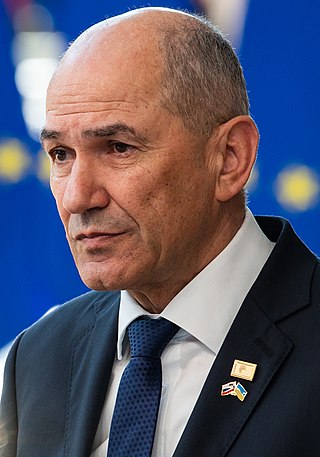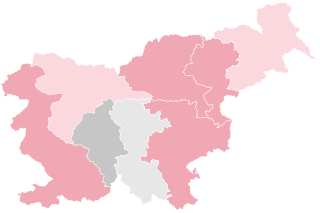
The Slovenian Democratic Party, formerly the Social Democratic Party of Slovenia, is a conservative parliamentary party; it is also one of the largest parties in Slovenia, with approximately 30,000 reported members in 2013.

Ivan Janša, baptized and best known as Janez Janša, is a Slovenian politician who served three times as a prime minister of Slovenia, a position he had held from 2004 to 2008, from 2012 to 2013, and from 2020 to 2022. Since 1993, Janša has led the Slovenian Democratic Party, which has emerged as the pre-eminent Slovenian conservative party. Janša lost his fourth bid for prime minister in April 2022, his party defeated by the Freedom Movement party.

Sevnica is a town on the left bank of the Sava River in central Slovenia. It is the seat of the Municipality of Sevnica. It is one of the three major settlements in the Lower Sava Valley. The old town of Sevnica lies beneath Sevnica Castle, which is perched on top of Castle Hill, while the new part of town stretches along the plain among the hills up the Sava Valley, forming another town core at the confluence of the Sevnična and Sava rivers.

Borut Pahor is a Slovenian politician who served as President of Slovenia from 2012 to 2022. He previously served as Prime Minister of Slovenia from 2008 to 2012.

Zoran Janković is a Slovenian businessman and politician serving as Mayor of Ljubljana since April 2012. He previously served as mayor from 2006 to 2011.
Gradac is a village in the Municipality of Metlika in the White Carniola area of southeastern Slovenia, close to the border with Croatia on the Lahinja River. It is now included in the Southeast Slovenia Statistical Region. The village is best known for well-preserved Gradac Castle.

Tivoli City Park or simply Tivoli Park is the largest park in Ljubljana, the capital of Slovenia. It is located on the western outskirts of the Center District, stretching to the Šiška District to the north, the Vič District to the south, and the Rožnik District to the west. Several notable buildings and art works stand in the park. Since 1984, the park has been protected as part of Tivoli–Rožnik Hill–Šiška Hill Nature Park. It is home to a variety of bird species.

Edvard Ravnikar was a Slovenian architect.
Cyberpipe was a hackerspace in Ljubljana, Slovenia, established in 2001 as a part of the K6/4 Institute. After a breakup with the parent organization and moving to a different location in 2013, it ceased most operations in 2015.

Parliamentary elections were held in Slovenia on 4 December 2011 to elect the 90 deputies of the National Assembly. This was the first early election in Slovenia's history. The election was surprisingly won by the center-left Positive Slovenia party, led by Zoran Janković. However, he failed to be elected as the new Prime Minister in the National Assembly, and the new government was instead formed by a right-leaning coalition of five parties, led by Janez Janša, the president of the second-placed Slovenian Democratic Party. The voter turnout was 65.60%.

Presidential elections were held in Slovenia on 11 November 2012, with a run-off held on 2 December. Slovenia's 1.7 million registered voters chose between the incumbent president Danilo Türk, the SDS/NSi party candidate Milan Zver and Borut Pahor of the Social Democrats who was also supported by the Civic List. The first round was won, contrary to the opinion poll predictions, by Pahor, with Türk placing second. In the run-off election, Pahor won with roughly two-thirds of the vote.

Miran Hladnik is a Slovenian literary historian, specializing in quantitative analysis of Slovene rural stories and in Slovene historical novel.

Alenka Bratušek is a Slovenian politician, who was the Prime Minister of Slovenia from March 2013 until May 2014 as the first woman in Slovenia to hold this position. She was president pro tempore of the Positive Slovenia party from January 2013 until April 2014. On 5 May 2014, Bratušek submitted her resignation as prime minister.

Mass graves in Ljubljana were created in Ljubljana, Slovenia during and after the Second World War. The Commission on Concealed Mass Graves in Slovenia has registered five known mass graves in the city itself and an additional 15 in the City Municipality of Ljubljana.

Parliamentary elections were held in Slovenia on 13 July 2014 to elect the 90 deputies of the National Assembly. The early election, less than three years after the previous one, was called following the resignation of Alenka Bratušek's government in May. Seventeen parties participated, including seven new parties, some of which formed only months before the election took place. Party of Miro Cerar (SMC), a new party led by lawyer and professor Miro Cerar, won the election with over 34% of the vote and 36 seats. Seven political parties won seats in the National Assembly. Three political parties left the Assembly, including Zoran Janković's Positive Slovenia, the winner of the 2011 election. A leftist United Left party entered the Assembly for the first time, winning six seats.

Rog Autonomous Factory, known as Rog, was a squatted bicycle factory in Ljubljana. It was used as a cultural centre and self-managed social centre from 2006 until 2021. The complex housed a music venue, a skate park, a medical clinic for asylum seekers, a football pitch and artist ateliers. After years of debate over its future, the centre was evicted by the city council in January 2021.

Presidential elections were held in Slovenia on 22 October 2017. Nine candidates ran in the first round of the elections, in which the incumbent independent President Borut Pahor placed first and Marjan Šarec of the List of Marjan Šarec (LMŠ) placed second. No candidate received a majority of the vote in the first round, resulting in a run-off between Pahor and that was held on 12 November 2017. Pahor won the run-off with 53% of the vote; voter turnout in the second round was 42.13%, the lowest in any presidential election since independence.

The Left is an eco-socialist and democratic socialist political party in Slovenia. The party was established on 24 June 2017 by the merger of the Party for Sustainable Development of Slovenia (TRS) and Initiative for Democratic Socialism (IDS). The party is a successor of the left-wing electoral alliance, the United Left.
Jernej Šugman was a prominent Slovenian theater, television and film actor.

Simon Maljevac is a Slovenian LGBT rights activist, politician and current Minister of Solidarity-Based Future of Slovenia. He was the general-secretary of The Left from 2018 to 2022

















